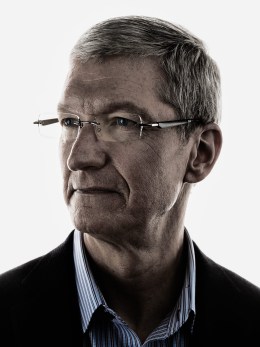
Like Jobs, Cook suffers fools neither gladly nor in any other way (except when he has to, i.e., when talking to journalists). Behind the scenes, that measured calm can — if the legends are true — become a merciless coldness that roots out confusion and incompetence. “I’ve always felt that a part of leadership is conveying a sense of urgency in dealing with key issues,” he says. “Apple operates at an extreme pace, and my experience has been that key issues rarely get smaller on their own.” The definitive Tim Cook anecdote involves a meeting he once called about a crisis in China that required a hands-on solution. After 30 minutes, he looked at one executive and said, “Why are you still here?” The man — a sense of urgency having been successfully conveyed — immediately left the meeting, drove directly to the airport and flew to China, without even a change of clothes.
Like Jobs, Cook never shows any doubt in public, either about himself or about Apple, not a scintilla, not for an instant. He rarely strays far from his core message about Apple: that it’s the best, most innovative company in the world, that consumers love it and that it is his privilege to work for it and for them. When speaking about his management style, Cook begins, “CEOs are all packages of strengths and …” He hesitates, looking for some way to reroute the sentence around the word weaknesses. Then he finds it: “and so forth.”
(GALLERY: TIME’s Steve Jobs Covers)
And like Jobs, Cook has reason to think of himself as an outsider, even as he sits at the center of global techno-cool, piling up a considerable personal fortune. (In 2011, Apple awarded Cook a golden-handcuffs package of options potentially worth more than $376 million.) Jobs’ story is well known: he was adopted — the biological son of a Syrian graduate student — and he was a college dropout. Cook’s story is very different but no less singular. He’s highly discreet about his private life, but this much is public record: Cook grew up in a small Alabama town called Robertsdale (pop. 5,402), the son of a shipyard worker. According to a speech Cook gave at Goldman Sachs this year, he worked in a paper mill and an aluminum plant. Jobs was at least middle class and a native son of Silicon Valley. Cook is, by all indications, a working-class kid from the Deep South.
Cook earned a degree in industrial engineering from Auburn University in 1982. From there he did the expected thing: he spent 12 years at IBM, where he showed a flair for a finicky, unglamorous side of the business: manufacturing and distribution. From IBM, Cook bounced to Intelligent Electronics and then in 1997 to Compaq as vice president for corporate materials. Then he did the unexpected thing.
(PHOTOS: A Brief History of the Computer)
Almost immediately after he arrived at Compaq, Cook began to get calls from Apple’s headhunters. Jobs was back from exile — he was pushed out from Apple in 1985, then rehired 12 years later — and he wanted to bring in somebody new to run operations. At that point Apple was generally considered to be in a death spiral — that year alone, it lost a billion dollars — and Cook had no interest whatsoever in moving. But Jobs was a legend in the industry, so Cook sat down with him one Saturday morning in Palo Alto. “I was curious to meet him,” Cook says. “We started to talk, and, I swear, five minutes into the conversation I’m thinking, I want to do this. And it was a very bizarre thing, because I literally would have placed the odds on that near zero, probably at zero.”
Cook was interested in Jobs’ strategy, which he describes using a favorite Cook expression, doubling down: “It was the polar opposite of everyone else’s. He was doubling down on consumer when everybody else was going into enterprise. And I thought it was genius. Compaq was doing so poorly in consumer, didn’t have a clue how to do consumer. IBM had left. Everybody was kind of concluding that consumer business is a loser, and here Steve is betting the company on it.”
It wasn’t just what they were doing at Apple, it was how they were doing it. The culture was different. “I loved the fact that I could disagree with Steve and he wasn’t offended by it.” For his part, Jobs must have seen something in Cook that wasn’t obvious to anybody else: the maverick, the outsider. “I’ve never thought going the way of the herd was a particularly good strategy,” Cook says. “You can be assured to be at best middle of the pack if you do that. And that’s at best.”
Cook got home on Sunday. Jobs offered him the job on Monday. On Tuesday, Cook resigned from Compaq. The same way Ive became Jobs’ trusted lieutenant on the design side, Cook stepped into that role in the less sexy and consumer-facing but equally vital area of manufacturing and distribution.
As COO, Cook was content to be a wizard in the dark art of supply-chain management. As CEO, Cook has had to decloak, to focus on the very public product side, the way Jobs did. When Cook looks back at 2012, that’s where he puts the emphasis. “It’s the most prolific year of innovation ever,” he says. “If you went back and were to watch a compressed movie of it, it’s amazing the products that have come out.”

